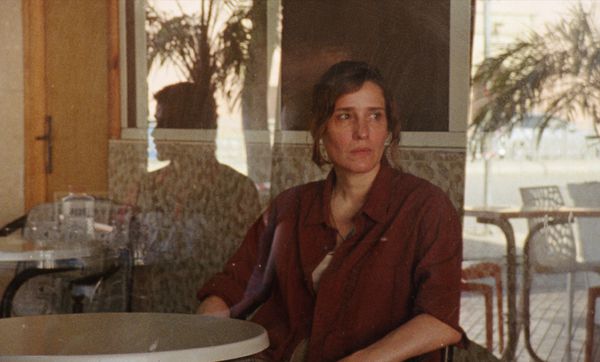 |
| Helena Wittmann on Ida (Angeliki Papoulia) in Human Flowers of Flesh: “She’s not looking for fulfilment of any sort, but only following her curiosity.” |
Marguerite Duras’s The Sailor From Gibraltar, and, more obscurely, Swiss legionnaire and writer Friedrich Glauser’s Gourrama are washed ashore as literary flotsam, cultural remnants of boredom, dust, and heat and ultimately the longing for connection with another being in this world. And there will be Galoup, as played already a quarter of a century ago by Denis Lavant in Claire Denis’s Beau Travail, based on Herman Melville’s Billy Budd.
 |
| Helena Wittmann with Anne-Katrin Titze on Denis Lavant as Galoup: “I mean, you met him, so you know. He’s really a rich personality.” |
Ida (Angeliki Papoulia) and her crew (Mauro Soares, Ingo Martens, Steffen Danek, Vladimir Vulevic, Gustavo de Mattos Jahn, Ferhat Mouhali) from different countries cross the Mediterranean on a sailboat to explore the original headquarters of the French Foreign Legion in Sidi-Bel-Abbès in Helena Wittmann’s quietly disturbing Human Flowers Of Flesh (a highlight in the Currents programme of the 60th New York Film Festival).
This is a film of spaces merging, physically in image, in thought, and of the senses. Shadows are literally boxing. A pool-cleaning machine becomes sea creature to the eye as it transgresses into the reflexion of the rocky wall behind the man looking on. The legionnaires have songs with lyrics proclaiming “we need space to tan our corpses.”
From Hamburg, Helena Wittmann joined me on Zoom for an in-depth conversation on Human Flowers of Flesh
Anne-Katrin Titze: Hi!
Helena Wittmann: Hi, so nice to meet you!
AKT: Good to meet you and good afternoon! Your film has boundaries disappearing. It seems as though you invite us to rethink many categories of what is what by creating a foreign legion of its own. Is that fair to say?
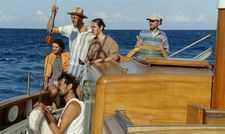 |
| Ida (Angeliki Papoulia) with Mauro (Mauro Soares), Falco (Steffen Danek), Ingo (Ingo Martens), and seated on deck Vlad (Vladimir Vulevic) |
HW: Yes, it’s definitely that I’m questioning boundaries, or maybe even that I experience it more this way. The way I’m showing it is more adequate to how I experience being in this world, if you want to put it this way. Of course there are aspects of biology, something that’s more to do with matter, and then also cultural aspects of course. And I think the French Foreign Legion is part of this - of culture, of militarisation, it’s maybe not the most beautiful part of it, but it’s still part of it.
AKT: The Foreign Legion is everywhere and I want to talk about all those cultural elements that are washed ashore. When did you first become aware of the Foreign Legion?
HW: Really aware when I was in Marseille, visiting a friend, and he was showing me around. This centre that we see in Human Flowers Of Flesh in the beginning when Ida sees for the first time legionnaires, where she hears the first song. That’s actually the place where I also saw legionnaires in real life for the first time. Before that I thought that was something that belonged to the past, the colonial past of Europe, of France. And then realising that’s not the case and that they still exist, that aroused my curiosity. But it took some more time and some other encounters until I started really researching about it. Of course I knew Beau Travail for example, by Claire Denis.
AKT: Of course.
HW: And that’s why it’s also in the film. Denis Lavant in this film is like an icon for me for a legionnaire. I knew about them but I never questioned it. When I watched the film it was there; it was like an entity that existed but I didn’t question it. This started afterwards with working on my film.
AKT: It’s so interesting how much we take for granted. We watch something and think it’s simply there. While watching your film, so many references came to mind. I became aware how much these legionnaires were hovering, like shadows, to reference your shadow boxing scene. But I want to speak about Denis Lavant.
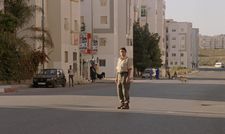 |
| Denis Lavant as Galoup |
I talked with him over lunch in 2017 when he had just finished filming The Mountain and he was on to do Beckett in the theater in Paris. You capture him and his persona so perfectly, especially in the scene with the eggs! There is on the one hand [Sergeant] Galoup from Beau Travail, but there is also clearly Denis Lavant.
HW: I started with the figure, the character of Galoup, but then when I met Denis… I mean, you met him, so you know. He’s really a rich personality. He’s so curious, so liberated, so free also. I very much like that. Then of course his physicality, all these aspects have to do with himself. When I met him I rewrote the scene.
Actually in the first script the scene that Ida enters the apartment didn’t exist. It would stop when she kept the door open to the house but we wouldn’t see her enter. When I started filming, I thought, no, they have to meet, I want them to meet. I had also the desire to see them together and to create a situation. This is very often also a motor for me - what do I want to see or to create, because this is what you can do when you make films, I mean it’s beautiful.
AKT: Very good, yes, you set the stage, you create your legions.
HW: Yes, the scene how it is now in the film was really written. So when I had met him, and I knew Angeliki [Papoulia] already quite well, I wrote this scene, also with the eggs. I didn’t even ask him if he could juggle but I supposed because he came from the artistic circus he would be able to. I think I wrote like four eggs. And then he said “Oh, four eggs that’s very difficult.” So we “reduced” to three. It also had to do with him being so good with rhythms, his musicality. And when I realise something like that in someone I’m working with, of course I want to include it and make profit from it in the best sense.
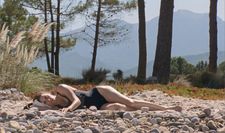 |
| Angeliki Papoulia as Ida on the rocks |
AKT: He is terrific. The title of your film is already so mysterious, I don’t know if there’s a clue to unravel it. It conjures up all kinds of imagery. Again the boundaries are broken up. I was thinking of that beautiful shot of the cleaning machine in the pool. It looks like an animal and you have the reflexion of the rocks. Somehow that is the closest image to represent the title for me in the film. There is a human watching too. Do you want to say something about the title?
HW: Really beautiful that you name this shot because I think you’re right. Because this shot is one that was not in the script. Usually I know the locations very well before. In this case we had a different one - that is another story. The people got arrested, so it had to close down, and we had to find another place to shoot actually. And it was this place. And then there was this swimming pool and with the rocks included in the building, I thought, wow, this is amazing.
Then I saw this robot and said, okay, we have to shoot this scene here. For me it’s the same, somehow it’s like a summary of many things that are in the film, that are layered. We had the water but it’s artificial, then we have this broken floor. We have the reflexion of the rocks, the plants, the human, the gaze. I mean there are so many things packed already in this shot.
What I also like is that you said that the title conjured up things because I also think it’s a lot about this. It’s like when you combine things with filmmaking, but also with film and our thoughts, you know, how our brains work when you get material. And then you conjure up something, something can come to the surface. It’s a little bit bewitching. It’s magic. And the title for me is also very much that I have no clue about it. So there is no solution. And I guess if I had it, I wouldn’t have used it. It’s exactly about this. There are so many questions around it and I love that. So it keeps resonating.
 |
| Helena Wittmann: “And then there was this swimming pool and with the rocks included in the building, I thought, wow, this is amazing.” |
AKT: Ending in flesh is so violent in a way. In the film violence is hovering at the borders. The moment when Ida is following Denis Lavant’s character to the apartment, I had to think of Marlene Dietrich following Gary Cooper in Morocco.
HW: Wow!
AKT: That ending I remember seeing on television as a child and it disturbed me so much. I remember asking questions - why do these women go and follow the men? What is happening to them? That shot was terrifying and fascinating and kind of world-changing to me. And although very different, I was suddenly thinking about von Sternberg’s Morocco and that ending. Were you thinking about Morocco?
HW: I wasn’t, but it’s really interesting and someone actually mentioned that scene, because we shot in Morocco. It’s Algeria in the film. It’s interesting what you say about that movement of following a man, because Ida is in this but it’s so different, the motivation. She’s also very free and she decides. She’s not looking for fulfilment of any sort, but only following her curiosity. With the flesh and this violence in general, I always want to embrace that ambiguity or ambivalence. The film is beautiful, yes, but then it’s very violent and dark at the same time, but they go together. I’m not interested in simplifying it too much.
This is what to me is very violent right now, in our times, that people try to categorise things and make them as easily understandable as possible and I think it’s just not the way this world is. Or for me it’s not.
AKT: It’s the loss of nuance when you go with the lowest common denominator. The soul cannot be in that. Just one more point about the woman following a man. Your film starts out with a group of men following a woman down a path on the rocks. It’s very clear that you are not doing the end of Morocco. Another classic movie came to mind when one of the men onboard asks “Which wind was it today?” The answer is “southwest,” and somehow, maybe because of the “w”, maybe because of the accent, I was thinking of Casablanca and the German refugees practicing their English: “What watch, Darling?” “Ten watch.” “Such much?”
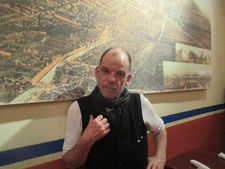 |
| Denis Lavant in New York Photo: Anne-Katrin Titze |
HW: Oh wow!
AKT: It’s fascinating where the flotsam of culture rolls back in.
HW: Totally, and you have this whole history of Germans being in North Africa for the Legion. Around the two big World Wars there were always a huge amount of Germans taking part, so they inhabited these countries, cultures, landscapes. Again it’s like conjuring up, you put it in and it recalls a memory of a film with you now. I love it, I mean, it’s beautiful to hear.
AKT: In the title you have flowers, you have humans, you have flesh. I like how you shot the animals in the film, the various cats moving around, the beautiful shot of the spiders, and of course the jellyfish parachutes that drop from the plane. You go into the territory of where does humanity end or where does it begin.
HW: Yeah, totally, and I feel for me it’s very much connected. Maybe that’s why it’s not even in the title. Thinking about these parachutes as jellyfish, I actually in some edits had some jellyfish, but then in the end you reduce things because it’s clear and you see it. Also how people build these parachutes, they took an example from these animals, so it’s in both directions it informs, no?
AKT: Yes, and on film so do shadows, such as the Go game and the dotted shadow on the side and then another pattern. We are all connected and if we forget that then bad things come our way. I do want to ask you about Friedrich Glauser. I looked him up, born in 1896, a Swiss writer in the French Foreign Legion. You quote him. What is his role here?
HW: This book, Gourrama, by him was recommended to me by a friend in the time I was researching and starting to write the film. I was going in many directions about the Foreign Legion and I read many protocols or reports of being there but obviously most of them are interesting, but not literally or not from an artistic point of view. And this book - I don’t know if there’s an English translation - is really a good piece of literature.
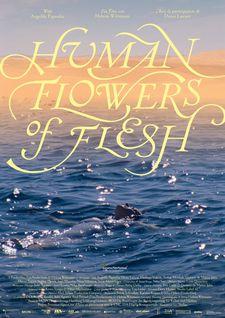 |
| Human Flowers Of Flesh poster |
He went to the legion and my figure says in the film that he probably went there to write about it, not for any other reason. I don’t know, but what he writes about is these long days and the boredom and the violence that comes out of this. Hanging around together, only men, the desert, there’s nothing to do, everything is precarious, everybody is longing for closeness. Not even love, I think it’s tenderness or something like that. How he describes it is very strong. It’s also something that made me understand certain aspects of the Legion better, I think.
AKT: The boredom, the heat, the dust, someone dies of fever buried in the sand, everyone raw and tender, looking for closeness - these are my notes from people talking that are overheard. The boredom not only describes the Legion then, but has aspects of the present now.
HW: Totally. I don’t know if these mercenaries from Wagner or Blackwater, I’m pretty sure they took an example from the Foreign Legion. I mean the Foreign Legion is part of the army, it’s not private, which Blackwater is and Wagner, well they say so but it’s a mix. It’s very very contemporary, all these questions.
AKT: Of course we have to talk about Marguerite Duras, the other voice.
HW: Yes, she is becoming more and more important. I have here several books, I always loved reading her. Also her films, which are very much underestimated. It’s some incredible work and I’m just now trying to find out what my connections with her are because in a way she did very different films. Her idea of filmmaking or how she treats language.
But then I feel so linked to her. There’s a connection. She’s very rigorous, that’s what I like, but what entered also into my film is a certain kind of romanticism. She managed to do that without getting into any kind of kitsch. It’s always very profound and concrete. And I love that about her. She’s very unique.
AKT: There is always a sense of rediscovery with her for me too. There’s Duras scattered around my bookshelves as well.
HW: She is such a good observer in any and every detail. That’s great and also how she treated her own history, the colonial, I mean she was so much ahead and brave, I think, how she describes it.
 |
| The 60th New York Film Festival runs from September 30 through October 16 |
AKT: The ultimate legionnaire. Are you coming to New York?
HW: I am coming on the 9th and staying until the 15th. Will you be there?
AKT: I will be all over at the festival. See you there!
HW: See you at the festival! Have a nice day and thanks a lot for the questions!
Human Flowers Of Flesh will screen at the New York Film Festival on Monday, October 10 at 2:45pm - Walter Reade Theater; Tuesday, October 11 at 9:15pm - Howard Gilman Theater. Helena Wittmann will participate in Q&As on both days.
The 2022 New York Film Festival runs from September 30 through October 16.





















